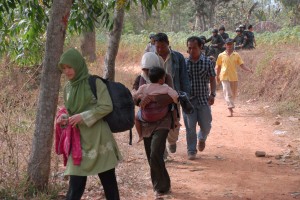Indonesia has long been seen as a “haven of tolerance” but today, religious freedom is slowly being eroded. Amnesty’s Papang Hidayat travelled to Indonesia to find out more.
Whistling while praying, claiming to be a prophet or receiving a revelation from God – just some of the actions that could land you in prison for up to 5 years in Indonesia for blasphemy.
Once hailed as an example of democracy, now religious groups from across different faiths are using the Blasphemy law to silence those with different beliefs.
One of those communities facing persecution is the Shi’a community from Karang Gayam village in the Sampang district, East Java. I met Ikil Muluk from the village in a small family-run restaurant in Sidoarjo, East Java. He told me:
“Tensions had been building since 2006, but one evening in December 2011 they came to a head. About 300 people came to my village looking for my brother Tajul. They burned down his house and someone from the crowd shouted to burn my house down too.
“At the time there were around 45 members of the Police’s Mobile Brigade there. I asked the local Chief of Police what to do, and he told me that his men were standing-by at my house… but the police took no action.”
The mob was looking for Ikil’s brother Tajul Muluk, a Shi’a community leader and religious teacher. After the attack, the Indonesian Ulema Council, a non-governmental religious body, issued a decree (fatwa) stating that Tajul Muluk’s teachings were “deviant”. By March, Tajul had been arrested and charged with blasphemy.
Worse was to come. In August 2012, 60 families were forced to flee their homes again when an anti-Shi’a mob of about 500 people attacked the village, setting fire to houses and attacking people with sharp weapons and stones. One villager was killed and dozens were injured.
Living in limbo
After the attack, the villagers were housed in a sports centre in Sampang for nearly 10 months. Facilities at the temporary shelter were extremely basic. The local authorities failed to provide medicines for the sick and at one point, cut off water and food supplies for two weeks.
Some community members were intimidated and harassed by local government officials, and told they had to convert to Sunni Islam if they wanted to return to their homes.
The families were forcibly moved again by local authorities to another location in Sidoarjo, East Java – at least a four hour drive from their homes.
Despite President Susilo Bambang Yudhoyono promising to return the community to their village and rebuild their homes a year ago, local authorities continue to block their return and harass the villagers.
Today, they remain in the temporary shelter. But are still hopeful that they will be allowed to go home and resume their lives as tobacco farmers, away from the humiliation that Ikil describes in the shelters:
“There is no way to earn a living in the temporary shelters and amenities are very basic. We have to rely on the government to pay our water and electricity bills. They give us rice and ready-cooked meals. Sometimes the government official says disturbing things to us such as ‘you (the Shi’a) do nothing all day but eat and sleep’.”
Religious intolerance on the rise
The Shi’a community’s plight is emblematic of the growing intimidation and harassment that minority religious groups face in Indonesia. Many communities, including Ahmadiyya, have been attacked and forced to flee their homes. Often no-one is held responsible.
Tajul Muluk remains in prison, serving a four year prison sentence for doing no more than peacefully practicing his religious beliefs.
/129

